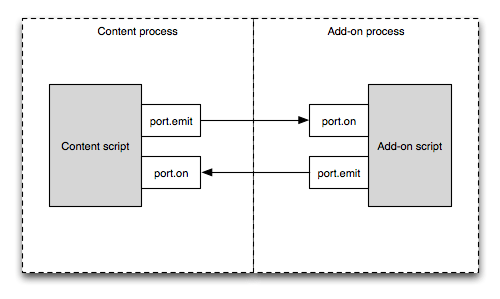Communicating using "port"
To enable add-on scripts and content scripts to communicate with each other,
each end of the conversation has access to a port object which defines two
functions:
emit() is used to emit an event. It may be called with any number of
parameters, but is most likely to be called with a name for the event and
an optional payload. The payload can be any value that is
serializable to JSON
1 | port.emit("myEvent", myEventPayload); |
on() takes two parameters: the name of the event and a function to handle it:
1 2 3 | port.on("myEvent", function handleMyEvent(myEventPayload) { // Handle the event}); |
Here's simple add-on that sends a message to a content script using port:
1 2 3 4 5 6 7 8 9 10 11 12 13 14 | var tabs = require("tabs");var alertContentScript = "self.port.on('alert', function(message) {" + " window.alert(message);" + "})";tabs.on("ready", function(tab) { worker = tab.attach({ contentScript: alertContentScript }); worker.port.emit("alert", "Message from the add-on");}); |
We could depict the interface between add-on code and content script code like this:

Events are asynchronous: that is, the sender does not wait for a reply from the recipient but just emits the event and continues processing.
Accessing port in the Content Script
Note that the global self object is completely
different from the self module, which
provides an API for an add-on to access its data files and ID.
In the content script the port object is available as a property of the
global self object. Thus, to emit an event from a content script:
1 | self.port.emit("myContentScriptEvent", myContentScriptEventPayload); |
To receive an event from the add-on code:
1 2 3 | self.port.on("myAddonEvent", function(myAddonEventPayload) { // Handle the event}); |
Compare this to the technique used to receive built-in events in the
content script. For example, to receive the context event in a content script
associated with a context menu
object, you would call the on function attached to the global self object:
1 2 3 | self.on("context", function() { // Handle the event}); |
So the port property is essentially used here as a namespace for
user-defined events.
Accessing port in the Add-on Script
In the add-on code, the channel of communication between the add-on and a
particular content script context is encapsulated by the worker object. Thus
the port object for communicating with a content script is a property of the
corresponding worker object.
However, the worker is not exposed to add-on code in quite the same way
in all modules. The panel and page-worker objects integrate the
worker API directly. So to receive events from a content script associated
with a panel you use panel.port.on():
1 2 3 4 5 6 7 8 9 | var panel = require("panel").Panel({ contentScript: "self.port.emit('showing', 'panel is showing');"});panel.port.on("showing", function(text) { console.log(text);});panel.show(); |
Conversely, to emit user-defined events from your add-on you can just call
panel.port.emit():
1 2 3 4 5 6 7 8 | var panel = require("panel").Panel({ contentScript: "self.port.on('alert', function(text) {" + " console.log(text);" + "});"});panel.show();panel.port.emit("alert", "panel is showing"); |
The panel and page-worker objects only host a single page at a time,
so each distinct page object only needs a single channel of communication
to its content scripts. But some modules, such as page-mod, might need to
handle multiple pages, each with its own context in which the content scripts
are executing, so it needs a separate channel (worker) for each page.
So page-mod does not integrate the worker API directly: instead, each time a
content script is attached to a page, the worker associated with the page is
supplied to the page-mod in its onAttach function. By supplying a target for
this function in the page-mod's constructor you can register to receive
events from the content script, and take a reference to the worker so as to
emit events to it.
1 2 3 4 5 6 7 8 9 10 11 12 13 14 15 16 17 18 | var pageModScript = "window.addEventListener('click', function(event) {" + " self.port.emit('click', event.target.toString());" + " event.stopPropagation();" + " event.preventDefault();" + "}, false);" + "self.port.on('warning', function(message) {" + "window.alert(message);" + "});"var pageMod = require('page-mod').PageMod({ include: ['*'], contentScript: pageModScript, onAttach: function(worker) { worker.port.on('click', function(html) { worker.port.emit('warning', 'Do not click this again'); }); }}); |
In the add-on above there are two user-defined events:
clickis sent from the page-mod to the add-on, when the user clicks an element in the pagewarningsends a silly string back to the page-mod
JSON-Serializable Values
The payload for an event can be any JSON-serializable value. When events are sent their payloads are automatically serialized, and when events are received their payloads are automatically deserialized, so you don't need to worry about serialization.
However, you do have to ensure that the payload can be serialized to JSON. This means that it needs to be a string, number, boolean, null, array of JSON-serializable values, or an object whose property values are themselves JSON-serializable. This means you can't send functions, and if the object contains methods they won't be encoded.
For example, to include an array of strings in the payload:
1 2 3 4 5 6 7 8 9 10 11 12 13 14 15 16 17 | var pageModScript = "self.port.emit('loaded'," + " [" + " document.location.toString()," + " document.title" + " ]" + ");"var pageMod = require('page-mod').PageMod({ include: ['*'], contentScript: pageModScript, onAttach: function(worker) { worker.port.on('loaded', function(pageInfo) { console.log(pageInfo[0]); console.log(pageInfo[1]); }); }}); |
